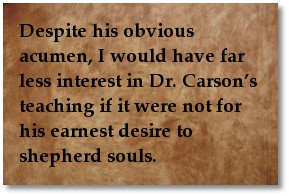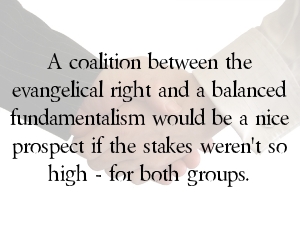I Learned it from Fundamentalists
 What follows should not be seen as any kind of “answer” to the essay by Dr. Kevin Bauder we posted here last week (what minor points I differed with him on are already expressed in the comments there).
What follows should not be seen as any kind of “answer” to the essay by Dr. Kevin Bauder we posted here last week (what minor points I differed with him on are already expressed in the comments there).
But it is a reaction of sorts.
Many have been announcing the death of the “Fundamentalist Movement” for some time. And these death knells are coming increasingly from those still inside whatever Fundamentalism now is. I don’t care to argue the question of the movement’s deceased status one way or the other here. But even contemplating its passing stirs me, because Fundamentalism (both the “movement” and the “idea”) has been a source of great blessing to me as God has used it my life.
1. Fundamentalism taught me expository preaching.
From early childhood, I was exposed to a broad spectrum of Fundamentalist preaching. At school, I heard the preaching of passionate evangelists who knew how to penetrate the apathy of hardened Christian school kids’ hearts and move us to walk aisles by the dozens. Sometimes (only God knows how often) the Holy Spirit was at work in these efforts as well and produced His fruit in lives.
Discussion
Let's Get Clear On This

A variety of electronic periodicals reach my inbox regularly. One that arrives nearly every day is published by a retired seminary professor. Most days I derive a great deal of pleasure and often profit from glancing through his cogitations.
Today’s number, however, evoked a bit of concern. The dear fellow was reprinting some criticisms that he had received. Here is what they said.
The oft-repeated mantra coming out of Dr. Piper and Dr. Storms is that it is impossible for human beings to enjoy too much pleasure. We are made for pleasure, but it’s the pleasure of enjoying God. These guys are full-bore new evangelicals and Piper is a hard line Calvinist…. Why are you promoting this sort of thing?
While I can appreciate many things coming out of Dr. Piper’s ministry, are you endorsing such a leading New Evangelical with no disclaimer?…I am sure you do not endorse the New Evangelicalism that is Dr. Piper’s ministry, but when we simply laud a New Evangelical by attending his conference and praising it, that is the result at the practical level.
These responses are typical of the way that some Fundamentalists view conservative evangelicals in general. These men apparently divide all American Christians into only two categories: Fundamentalists and neo-evangelicals. If a Christian leader is not recognized as a Fundamentalist, then he is considered to be a new evangelical, with all the opprobrium that follows.
This binary system of classification is far too simplistic. American Christianity never has been neatly divided between new evangelicals and Fundamentalists. Other groups have always existed, and one of them is the group that we now designate as conservative evangelicals.
Discussion
A Student’s Thoughts on D. A. Carson

Discussion
"Evangelicals have a craven need for acceptability by the wider world"
Body
Carl Trueman: The Real Scandal of the Evangelical Mind
Discussion
The Fundamentalist Challenge for the 21st Century: Do We Have a Future? Part 4
 The following is a portion of a paper Dr. Straub read at the Bible Faculty Leadership Summit last summer (he also read a variation at the Conference on the Church for God’s Glory last May). It appears here with light editing. See Part 1, Part 2, and Part 3. -Editor
The following is a portion of a paper Dr. Straub read at the Bible Faculty Leadership Summit last summer (he also read a variation at the Conference on the Church for God’s Glory last May). It appears here with light editing. See Part 1, Part 2, and Part 3. -EditorSo what of the future for fundamentalism? Is there hope? (cont.)
3. A more theological view of separation
Third, I think we need to work toward better approach to separation. Our practice is often weak and sloppy. This is because our thinking is weak and sloppy. We don’t read widely or think deeply about much of anything. Theological reflection is rare among us. We want simple answers to complex questions.
This sloppiness may be seen in the way we practice separation. It is often harsh and inconsistent. It lacks thoughtful reflection and purposeful expression. But we are not alone in our weak view of separation. I think evangelicals are also weak in this area. They actually do practice secondary separation but they do so inconsistently.
Discussion
The Fundamentalist Challenge for the 21st Century: Do We Have a Future? Part 3
 The following is a portion of a paper Dr. Straub read at the Bible Faculty Leadership Summit last summer (he also read a variation at the Conference on the Church for God’s Glory last May). It appears here with light editing. The paper will appear here in four parts. See Part 1 and Part 2. -Editor
The following is a portion of a paper Dr. Straub read at the Bible Faculty Leadership Summit last summer (he also read a variation at the Conference on the Church for God’s Glory last May). It appears here with light editing. The paper will appear here in four parts. See Part 1 and Part 2. -EditorSo what of the future for fundamentalism? Is there hope?
Having defined fundamentalism and having set it in the context of the evangelical right, I will devote the rest of this presentation to discussing where fundamentalism is going and what its future may be. We are less than a decade into the new millennium. It’s impossible to predict where we will be at the end of the century, but I am not too optimistic. A few months back I said some disparaging remarks about the current state of fundamentalism on a semi-private listserve I moderate. Word of what I said got out to a well-respected pastor in our circles and he contacted me to encourage me to be careful about dissing fundamentalism. He felt that I might hurt myself and ultimately Central Seminary. My response? I am a historian. We look at the past to understand the present. We look at the present to suggest what the future might be. Arnold Toynbee said once that “the only thing we learn from history is that we don’t learn from history.” I think we need to be honest with our past, realistic about our present and reflective about our future. Only then can we hope to remain faithful to God. I did not create the state that fundamentalism is in, but I think that glossing over our problems will help no one. Young men will continue to leave and the old men will continue to sit smug in self-denial. A real future demands serious reflection.
So what about historic fundamentalism in the 21st century? Do we have a future? Last May, my son graduated from Central with his M.Div. He is currently enrolled in our ThM program. When he finishes, he will go out into the Lord’s work. I wonder where he will land? What movement will he identify with in the next decade, or 30 years? Will he follow my path and remain within this movement called fundamentalism? Will there even be a fundamentalism as we know it? Some of these questions, I cannot answer. But the one I raised in my subtitle—Does Fundamentalism Have a Future?—I do wish to try to answer.
Discussion
The Fundamentalist Challenge for the 21st Century: Do We Have a Future? Part 2
 The following is a portion of a paper Dr. Straub read at the Bible Faculty Leadership Summit last summer (he also read a variation at the Conference on the Church for God’s Glory last May). It appears here with light editing. The paper will appear here in four parts. See Part 1. -Editor
The following is a portion of a paper Dr. Straub read at the Bible Faculty Leadership Summit last summer (he also read a variation at the Conference on the Church for God’s Glory last May). It appears here with light editing. The paper will appear here in four parts. See Part 1. -EditorNew-Image Fundamentalism (continued)
So if hyper-fundamentalism adds to the essential core, should we then speak of hypo-fundamentalism? Well, maybe, but I think “new-image” is a better term. A new-image fundamentalist does not like the negative image that older fundamentalism carries and wants to create a new category that will allow them to be seen in a better light by their fellow evangelicals.1 As such, some of the things that have given other parts of fundamentalism a bad image are jettisoned outright or quietly abandoned.
What are the characteristics of a new-image fundamentalist? Well clearly new-image men are evangelical in the classic sense of the term—committed to the core of Reformation truth summarized at least by the five solas: Scriptura, fides, gratis, Christus, and Deo Gloria. Part of the new image is pointing out their close affinity with other evangelicals in these important doctrinal views. “We believe what you believe—we cannot be that bad!” By saying this, I am not at this point meaning to exclude non-Calvinists necessarily from the term evangelical. But I am suggesting that there is, despite current revisionist notions within evangelicalism to the contrary, an essential body of truths that represent historic evangelicalism, including the nature of God, the reality and eternality of eternal punishment, etc. Little separates the new-image men who sometimes self-identify as fundamentalist from their conservative evangelical cousins. Both hold to some level of separation, primary at least, and even to some extent, so-called secondary separation. But the new-image men are tired of the hyper-fundamentalists and are looking desperately for something more balanced. They find that balance in the evangelical right.
Discussion
The Fundamentalist Challenge for the 21st Century: Do We Have a Future? Part 1
 The following is a paper Dr. Straub read at the Bible Faculty Leadership Summit last summer (He also read a variation at the Conference on the Church for God’s Glory last May). It appears here with light editing. The paper will appear here in four parts. -Editor
The following is a paper Dr. Straub read at the Bible Faculty Leadership Summit last summer (He also read a variation at the Conference on the Church for God’s Glory last May). It appears here with light editing. The paper will appear here in four parts. -EditorToday I wish to address fundamentalism at the beginning of the 21st century.
Discussion
Review - A Lover's Quarrel with the Evangelical Church
Full disclosure
Before I do this review, it’s importan

Discussion